Class Clown
Or, how I make my way through life
Ah, the class clown. The great-great-grandchild of the court jester and inverse of the Teacher’s Pet. Some are endearing, others less so. They take the temperature of the group to gauge what degree of humor is required to get everybody rolling, then they let ‘er rip. From then on it’s a battle of wills between the clown and the teacher trying desperately to hold the attention of the class, which, if the clown is worth his salt, is a hopeless endeavor. It seems evident enough that the desire to be entertained overrides the desire to absorb information, so the clown has that in his favor. That’s why comedy-news anchors like Jon Stewart and Stephen Colbert have been so successful; they’ve effectively married the two. I have always admired the art of clownery and have dedicated many years to perfecting my own brand of wit, if you can believe it.
Growing up I lived for comedy and used humor as my entrée into society, i.e. getting other kids to notice me. In the fifth grade my best friend Emily and I wrote and performed a skit for the middle school talent show: a customer (me) walks into a bakery and gets into a heated argument with the shopkeeper (Emily) about something (I forget), and demands retribution, then trips and wipes out on the floor as she’s leaving (banana peel humor); all this in our best go at a British accent while calling each other “Biscuit” and “Muffin” (deep apologies to my Brit reader(s)); and with an instrumental karaoke track of “Respect” by Aretha Franklin playing in the background1. Hmm. Writing it down now I question what we found so funny about this routine, but I’ll tell you what: in the year 2000, it SLAPPED with the student body of Central Middle School and made us household names in comedy. The most popular sixth graders who had up to that point been oblivious to my existence now gave me high fives in the hallway and said, “What’s up, Biscuit!” Never mind they were calling me by my fictitious pet name from the skit; they could have called me stage-right person and I’d have been thrilled.
I recently reread my journals from this era (aloud to my husband2) and it’s embarrassing to see how much stock I put into their praise; but I remember vividly the boost to my self-esteem this provided. It was my buoy in the incessant hormonal storm of early adolescence. Where other girls used the currency of being Hott or PHAT3 to gain popularity, I had found my fortune in being The Funny Girl.
Some notes on comedy
Everybody likes the funny guy. Doesn’t matter what kind of clique you’re in, if you’re funny, you’re vital to the group4. But there are parameters to your humor which must be observed lest you overstep and get yourself into hot water: Don’t use your wit to hurt or humiliate others; don’t crack insensitive or discriminatory jokes; don’t be obnoxious. It takes time to learn these limits and hone your craft, and many blunders will be made in the process.5
Comedic equations can include multiple clowns but they must contain at least one straight man to balance the joke - in the comedic, not the cis-het, sense6. A bunch of clowns flailing around is merely chaos, and frankly not that funny. But throw in an uptight maître d’, a hoity-toity lady, or even an inanimate object vis-à-vis the slapstick of Buster Keaton, and you’ve got yourself an act.
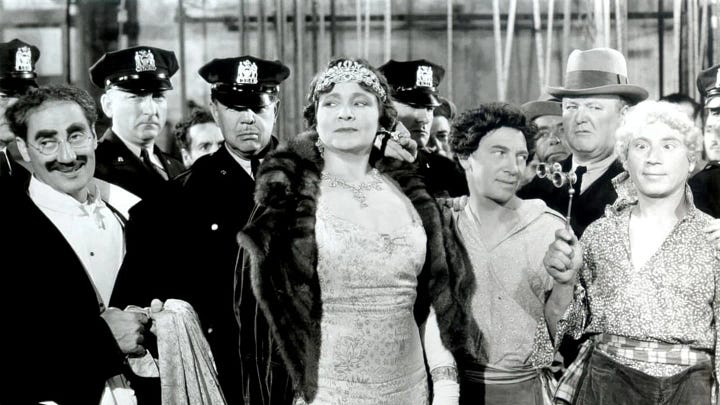

Now back to me
In the eighth grade I had US History class with Mrs. Rader, an older (to me), wickedly smart teacher who was frequently the target of jokes perpetuated by the empathy-depraved hoard of 14-year olds she spent her days teaching. There were jokes about her age, her hair, her clothes — lowball, unimaginative jokes. I enjoyed her as a teacher but couldn’t help myself from being a clown in her class; I was thirteen, after all, my life’s work at the time trying to impress the oily-nosed boys I was counting on someday marrying. One day, as she was giving her lecture and I was preoccupied with spitting witty quips at every turn, she called on me:
“Ginny, it seems you have a lot to say about this. Why don’t you help me teach the class?” I was stunned. What was she getting at?
“Come on up here and you can teach with me.”
I got up, unsure, and went to stand beside her.
“Now, whatever I say, I’d like for you to repeat it for the class.”
What, now? Well, alright.
So it went: she would lecture, pause, allow me to repeat her words in my clownish manner, then she’d speak again, on and on until the end of class. It was weird. It was funny. I was confused at the time, but looking back her strategy makes sense. She wielded my need for clownery to suit her own need to give the lecture, and like Stewart or Colbert, she married the two. She knew that learning and laughter are not mutually exclusive, and she avoided having to be the “bad guy” by shutting down the class clown. She also knew the cardinal rule of dealing with unruly students: give them a job. It was a stroke of brilliance on her part, something I’ve always remembered as a student and later as a teacher. Next class she proceeded with her regular lecture without my involvement, and I laid off the witticisms; I’d gotten it out of my system, felt seen. Plus I innately knew that if I pushed my luck I’d probably end up in trouble, or worse, no one would laugh the second time around. Her plan was a success.
Now, as a parent, I find myself having to step into the role held by Mrs. Rader, the conveyer of knowledge working alongside clowns. When I’m being serious and George is trying out a new comedy routine, cocking his head saying “Huh?” or spinning in circles eliciting deep belly laughter from Millie, I try to meet him in the middle, giving him his stage to perform while still pursuing my agenda.
For example:
George dumps his crayons on the floor.
Me: “Hey, bud, let’s pick up those crayons so we can go outside.”
Him: “RAAAAWWWWWRRR!” *stomps around with fists clenched*
Me: “Ohh, you can’t pick up the crayons because you’re a troll, huh? Well what if I EAT all the crayons! Nomnomnomnom!”
Him: “RAAAWWWWRRR!!!” *rushes over to crayons and puts them in the basket to keep me from eating them*
Me: “Oh no, foiled again!!! I’ll get you next time, crayons. Welp, let’s go outside.”
It’s a win-win: the crayons get picked up, he gets to stay in character, and I don’t have to be the bad guy.7
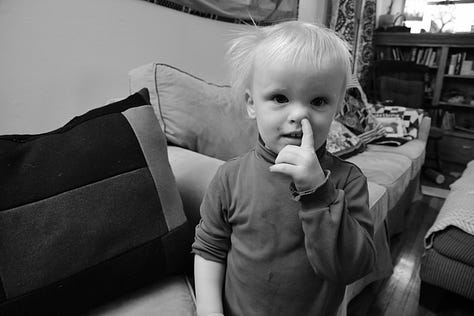
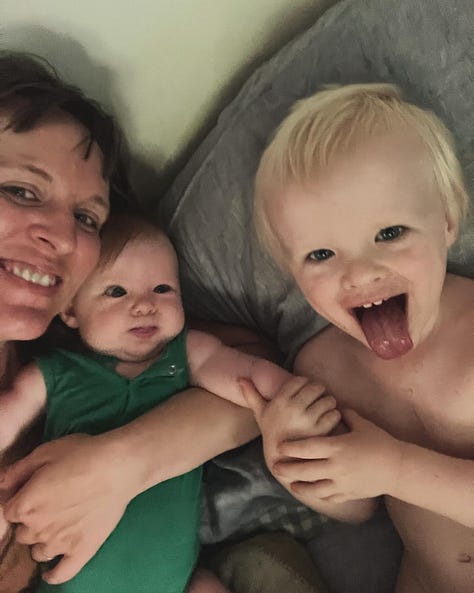

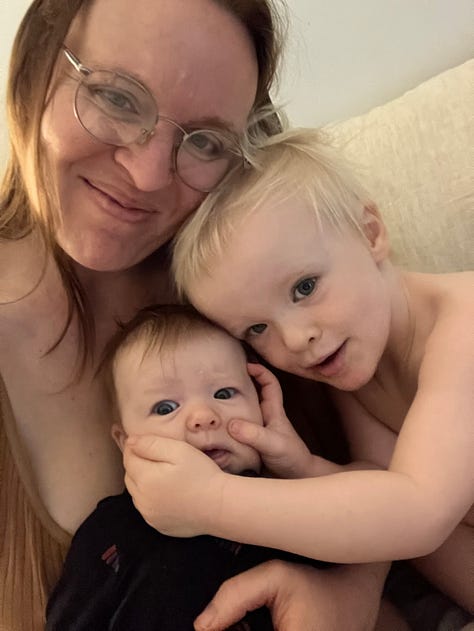
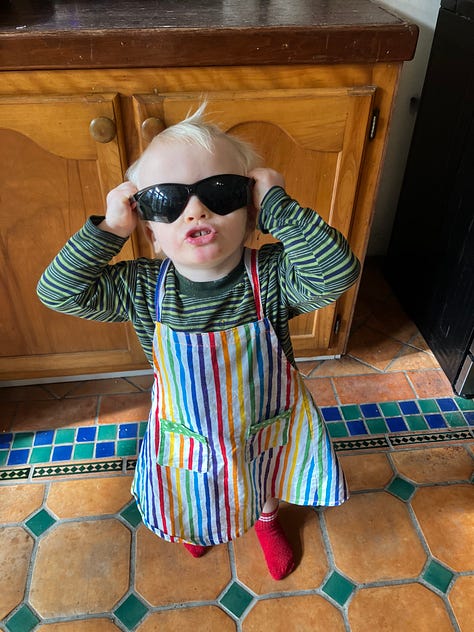

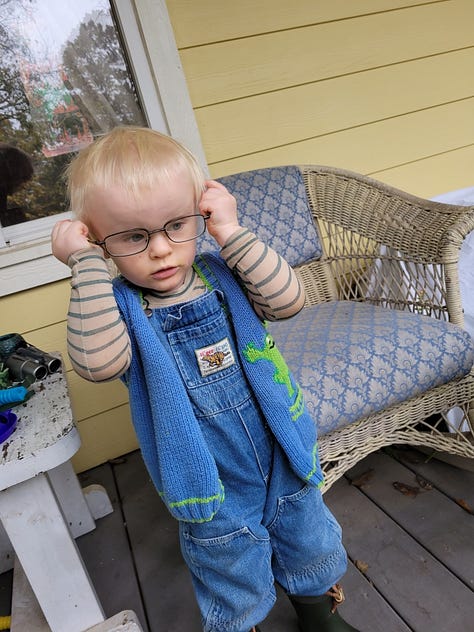

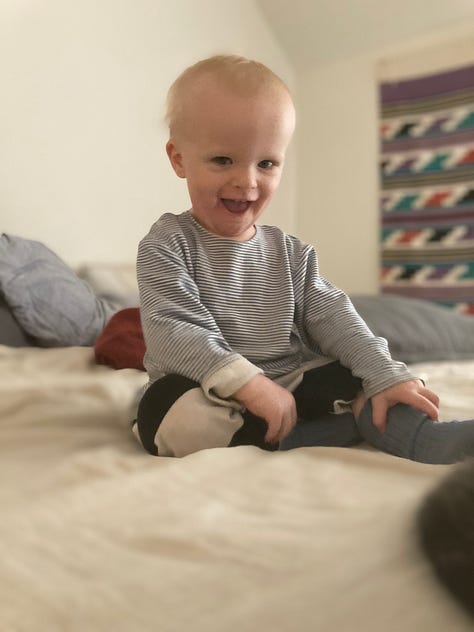
O Humor, my North Star
The presence of comedy in our day-to-day helps me keep things in perspective. Sometimes I get a little nutty about Doing Things Right, and lose my sense of humor, but my family always brings me back. Chris can save most moments with a joke, and George reels me back in with his big smile and ecstatic gestures. He knows what he’s doing; he’s a natural. He’s been taking cues from us since he was a baby as to what gets the biggest laugh, and he runs with a joke that works, which means we have to be very careful not to let him see the raised corners of our mouths when he does something that’s simultaneously unfavorable and hilarious8. I see in him the same need I possess, to be received and appreciated for his humor, which is an expression of his heart, and I want to nurture that, not squash it. But nurturing humor includes not just laughing at someone’s jokes but also giving honest feedback when a joke doesn’t work — whether it’s offensive, appropriative, or poorly timed (#TooSoon) — and then, without judgment, explaining why. Humor can be a practice in empathy, if you take the time to listen to feedback instead of being stubborn like many of today’s comedians who insist that people “just can’t take a joke.”
I’m happy to be in a family of funny guys. And from the way she laughs at her brother’s jokes, Millie’s gonna wallop us with her own brand of comedy, I have no doubt. The realm of silliness will expand even further and I will get to establish myself in the role of straight mom who plays along while ushering us out the door, through the days, balancing the fun with the function, marrying the two.
Until the next,
Ginny
My mom had to send off for a cassette of this particular track, as, believe it or not, it wasn’t available locally.
Not only did he stay with me, he says he likes me even better now.
Pretty Hot And Tempting: a modern-day Jezebel.
Even goth and emo cliques, if they still exist, love a funny guy. You just have to tailor your humor to fit the mood.
I’m grateful my bad and/or offensive attempts at humor are chronicled only in the memories of those who heard them and not, like many comedians, snapshot on Twitter for All of Eternity.
HAPPY PRIDE MONTH BTW!!! 🏳️🌈🏳️⚧️
I must note that this is not an absolute reality for us, and that there are plenty of times when I do have to be the bad guy, prompting tears and the like. As this newsletter’s name indicates: Tears and Mirth, baby, Tears and Mirth.
Chris and I switch off who gets to step away and laugh while the other parent addresses such a behavior in a serious manner.



I relate to a lot of this and find it helpful. I too have a partner who saves things/me with a joke and it’s just the best.
Oh, I wish Debbie Rader were still with us to enjoy the telling of this story. Your dad was the class clown extraordinaire. You come by it honestly!!